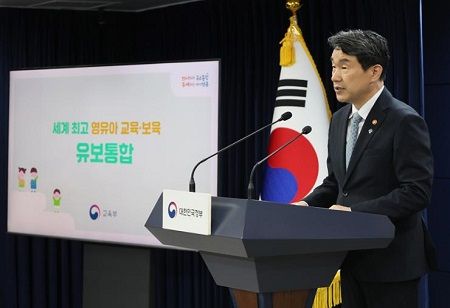In response to the nation's declining birthrate crisis, the Ministry of Education has introduced an integrated education and childcare system. This initiative seeks to establish a dependable environment where parents feel confident leaving their children in daycare facilities. With Korea's total fertility rate hitting a record low of 0.72 in 2023, the ministry stressed the importance of creating a solid framework for youth education and childcare to address the declining birth rate.
The education ministry is in exclusive charge of early childhood education and care, implementing a new integrated system. Under the previous system, infant education and care were divided between kindergartens and nurseries. Educational offices managed kindergartens, while local governments were responsible for nurseries. This dual system led to inefficiencies and varying service quality depending on the type of facility.
Last year, the government amended the Government Organization Act, centralizing all infant care responsibilities within the education ministry. As part of this revision, the ministry aims to simplify cost structures by adjusting standard expenses for infant education and care. Furthermore, initiatives are underway to integrate various education and childcare information systems into a unified platform for better cohesion.
The ministry plans to ensure 12 hours of daily education and childcare services for all infants who need them. To achieve this, the ministry will support morning and evening care for four hours in addition to the basic eight-hour operating day and provide dedicated personnel for the extended hours. The current after-school curriculum will be expanded to include play-based language, math, arts and sports programs tailored for infants and toddlers.
The teacher-to-infant ratio is set to undergo substantial improvements to enhance personalized care and education. For infants younger than one year old, the caregiver-to-child ratio will be lowered from one-to-three to one-to-two. Likewise, for children aged three to five, the ratio will be enhanced from an average of one-to-12 to one-to-eight. Additionally, the ministry has outlined intentions to offer educational support customized to infants' developmental stages.
Currently, the childcare programs for children under two and the curriculum for those aged three to five are separate. However, aligning with the global trend of offering systematic and appropriate early education, a unified curriculum for children from birth to age five will be developed by 2027 in collaboration with the National Education Commission. The U.N. Convention on the Rights of the Child underscores the importance of equal educational opportunities from birth.
Moreover, to ease financial pressure on families, the ministry plans to phase in free education and childcare for children aged three to five. This initiative will commence with five-year-olds in 2025 and is scheduled for full implementation by 2027. "The Yoon Suk Yeol administration has transferred infant care responsibilities to the education ministry, laying the foundation for high-quality education and childcare services from the start of life under one unified system", Education Minister Lee Ju-ho said.

